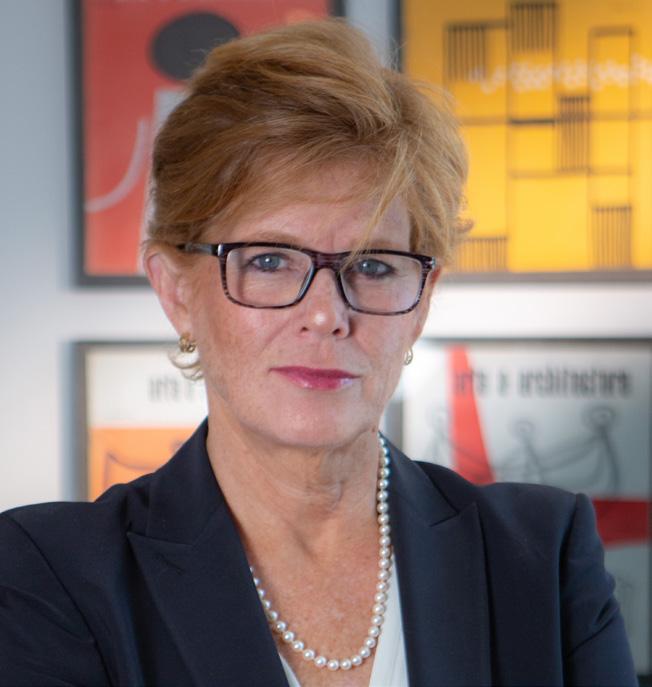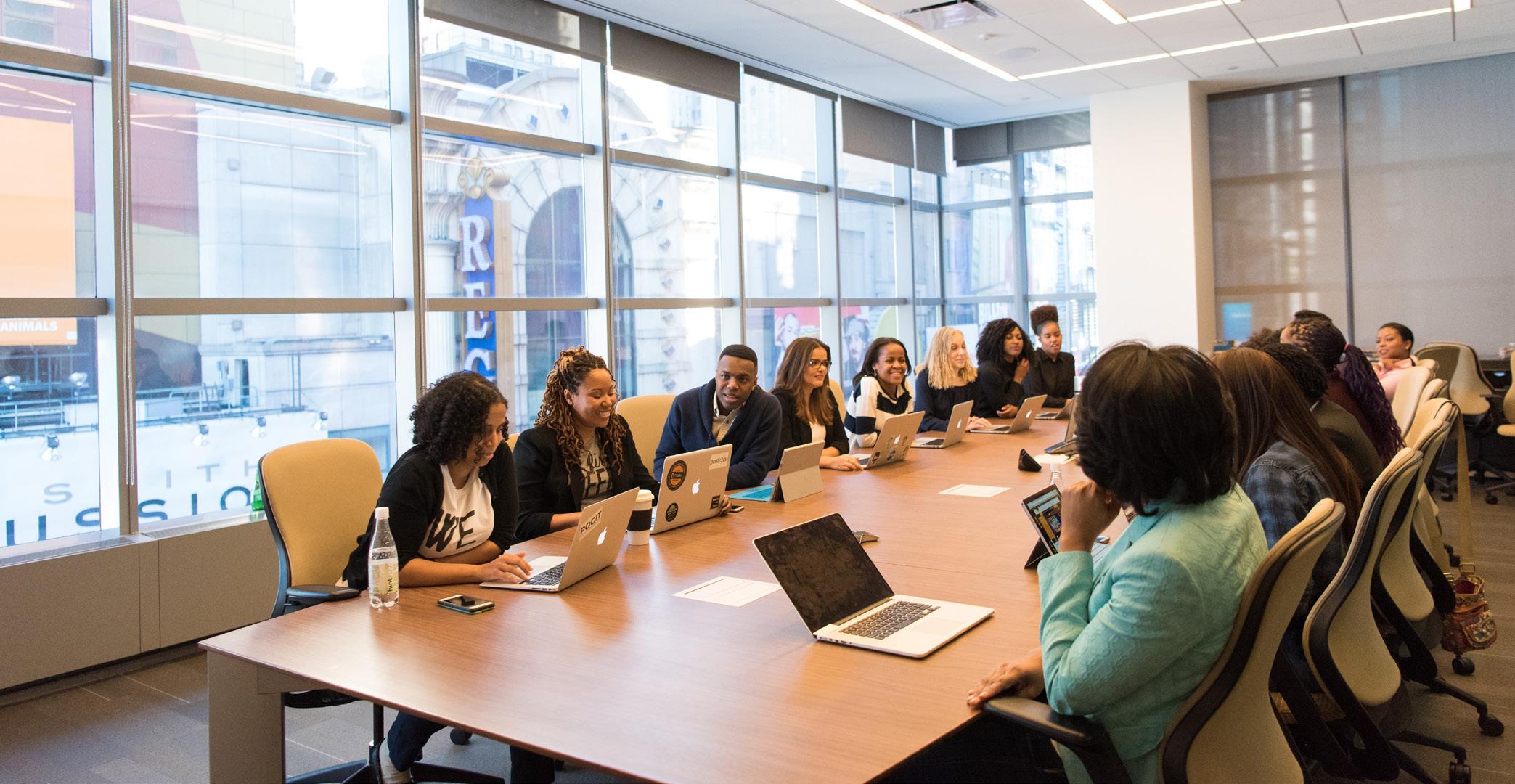
11 minute read
Making Buildings Perform for People Worldwide
RICS' Goal: Making Buildings Perform for People Worldwide
By Debra Hazel
Real estate, like politics, may be local — but there are a number of issues that have become a global concern, including sustainability, supply and labor issues and returning people to the office after COVID-19.
Ann Gray, CEO of Gray Real Estate Advisors, now serves as president of RICS (formerly the Royal Institute of Chartered Surveyors), which recently launched the International Building Operation Standard (IBOS), a new, data-based approach to measuring and managing how buildings perform for people, especially in a new era when flexibility is key. It builds upon traditional building performance assessments to include user experience to satisfy the needs of occupiers, investors, advisors and end-users.
“There’s a real recognition now that sustainable investing has a higher return,” Gray said. “All of our surveys are showing that a majority of people in our profession are considering sustainability when they participate in a project. That’s a positive trend. The data is there.”
That’s why RICS is among 50 professional organizations worldwide that have a created carbon standard for embedded and emitting carbon, she said.
Ann Gray
“You can start to measure the impact you’re having on carbon before you put a shovel in the ground,” she said. “These are huge trends and they’re not going away.”
In fact, she observed, climate change is posing an existential threat to the survival of entire nations.
“One of the things that excites me is what’s growing out of COP 26 [the 2021 United Nations Climate Change Conference]. It started as governments getting together to discuss fighting emissions and climate with some kind of consistency,” she said. “What’s really emerged from that is a body of shared global thinking about how we tackle these issues. It’s thrilling to see that sharing of knowledge and best practices.”
That was one factor behind the creation of IBOS, which was intended to support organizations in attracting people back to the workplace, by delivering confidence for end-users that the building they’re in is supporting their wellness, and benchmarking success against driving down the commercial sector’s carbon footprint.
The standard, which is supported by commercial and public sector organizations as well as service providers and existing certifications such as Well and Wired, is the first of its kind globally to deliver a consistent approach to help organizations assess and improve their building’s performance in such a broad way, RICS said. It will provide data on buildings with people at the center of future decision-making and help embed ESG into real estate strategy.
Many organizations already monitor their properties’ performance, including how sustainable a building is. But according to respondents to the RICS Global Commercial Property Monitor, only 79% of America’s respondents believed that there are currently techniques and practices in place to measure the environmental impact of buildings. Those that are in place need further development.

Also, while there is plenty of research on how people and buildings interact, data from the same survey shows that 81% of US and 86% of Canadian respondents are seeing a rising demand for more flexible workspaces. As property use changes, and the importance of a healthy work-life balance increases, there is a growing gap in measuring how a building impacts people’s wellbeing and how to attract people back to the workplace, where it is beneficial.
“The effective use of data can provide huge benefits in buildings. However, as the definition of building performance evolves and expands it is vital that there is a robust framework detailing the elements that need to be considered and the corresponding data to be used,” said Patrick Turner, chief technology officer of engineering for Acuto, in the announcement. “IBOS does just this and is a foundational step for the sector to fully leverage data in the years to come — ultimately to drive better performance in buildings whether for people, the planet or finances.”
But climate is just one of many global issues that Gray will consider during her term as president. Others are not so positive — yet.
“Another trend that I’m hoping is reversible is the concentration of wealth in fewer hands,” she said.
The post-Great Recession consolidation of the industry has consolidated wealth among fewer large companies, which have stockpiled construction materials due to supply chain issues that linger after the pandemic. Land banking is also taking place. As a result, smaller builders are struggling.
“Real estate was always kind of an odd, democratic process; all different kinds of people used their talent and ingenuity to meet market demand whenever and wherever it was needed,” Gray said. “It was a ragtag democracy. With the pandemic, there has been such a surge in demand and with the logistical challenges in getting materials and labor that there is a massive unfair advantage to a few players. At some point, we will end up with an exaggerated investment in a few key sectors when we really need it somewhere else.”
RICS' Goal: Making Buildings Perform for People Worldwide
By Debra Hazel
Real estate, like politics, may be local — but there are a number of issues that have become a global concern, including sustainability, supply and labor issues and returning people to the office after COVID-19.

Economic trauma often will lead to consolidation, as smaller, weaker companies can’t survive and are acquired, she observed. And that is taking place now. “The wealth gap, even in the property sector, is growing,” she said. That is exacerbated by the supply chain issues that plague the industry worldwide. It takes time to make the materials needed, including finding and mining the ore. “It’s going to be a slow process to ease things out,” she said. Developing professionals to join the industry also is a global issue that will take time to resolve. The causes of the shortage in the U.S. vary from retiring senior professionals and what many believe is an overemphasis on college education vs. trade school. Elsewhere in the world, shortages are occurring for other reasons. “For example, in India, they have other kinds of constraints on what people can enter what trades,” Gray related. “In the United States, the unions have always created the apprenticeships. Those structures don’t exist quite as formally in other parts of the world.” Globalization can offer extraordinary opportunities. Gray spoke of an RICS member who specialized in mapping and data analysis and was hired by the World Health Organization to map the spread of the Ebola virus so medical professionals could stop it. In addition to his own skillset, he had to learn about infectious diseases to achieve his goal. That portability of skills is what excites Gray about the real estate industry, she said. “You can be facilities manager in the U.S. or Paris and the jobs look roughly the same,” Gray said. “Mapping in Colorado or in Kenya is probably roughly the same. There’s a flexibility and creativity. There are no silos like there used to be. It’s a blast, and I encourage young people to pursue it.” So while individual properties must contend
Ann Gray, CEO of Gray Real Estate Advisors, with local laws, globalization can provide now serves as president of RICS (formerly invaluable best practices to the industry, the Royal Institute of Chartered Surveyors), especially for smaller countries that lack apwhich recently launched the International praisal standards and therefore don’t attract Building Operation Standard (IBOS), a new, as much investment. data-based approach to measuring and managing how buildings perform for people, es“What attracted me to RICS is the idea of a pecially in a new era when flexibility is key. It worldwide professional ethic that we all work builds upon traditional building performance to: transparency, standardized appraisals, assessments to include user experience to avoiding corruption and money laundering, satisfy the needs of occupiers, investors, ad- these kinds of things that surround the propvisors and end-users. erty business everywhere,” Gray said. These standards have long-ranging economic effects. Countries without a strict appraisal standard don’t have the tax dollars to solve housing and sanitation crises, she observed. “A lot of that comes from that faithfulness to abide by a set of rules, including intellectual capital in developing anti-money laundering, whistleblowing standards and valuation standards. It seems like a high-falutin’, piein-the-sky concept, but it actually makes a difference in people’s everyday lives. That excites me.”
“There’s a real recognition now that sustainable investing has a higher return,” Gray said. “All of our surveys are showing that a majority of people in our profession are considering sustainability when they participate in a project. That’s a positive trend. The data is there.” That’s why RICS is among 50 professional organizations worldwide that have a created carbon standard for embedded and emitting carbon, she said.
Ann Gray
“You can start to measure the impact you’re having on carbon before you put a shovel in the ground,” she said. “These are huge trends and they’re not going away.” In fact, she observed, climate change is posing an existential threat to the survival of entire nations. “One of the things that excites me is what’s growing out of COP 26 [the 2021 United Nations Climate Change Conference]. It started as governments getting together to discuss fighting emissions and climate with some kind of consistency,” she said. “What’s really emerged from that is a body of shared global thinking about how we tackle these issues. It’s thrilling to see that sharing of knowledge and best practices.”
That was one factor behind the creation of IBOS, which was intended to support organizations in attracting people back to the workplace, by delivering confidence for end-users that the building they’re in is supporting their wellness, and benchmarking success against driving down the commercial sector’s carbon footprint. The standard, which is supported by commercial and public sector organizations as well as service providers and existing certifications such as Well and Wired, is the first of its kind globally to deliver a consistent approach to help organizations assess and improve their building’s performance in such a broad way, RICS said. It will provide data on buildings with people at the center of future decision-making and help embed ESG into real estate strategy. Many organizations already monitor their properties’ performance, including how sustainable a building is. But according to respondents to the RICS Global Commercial Property Monitor, only 79% of America’s respondents believed that there are currently techniques and practices in place to measure the environmental impact of buildings. Those that are in place need further development.
2 1 0 0 AT T O R N E Y S | 4 1 L O C AT I O N S W O R L D W I D E˚
Helping clients identify opportunity and manage risk.
With five decades of business-driven legal experience and more than 60 real estate lawyers serving the New York real estate market.
Also, while there is plenty of research on how people and buildings interact, data from the same survey shows that 81% of US and 86% of Canadian respondents are seeing a rising demand for more flexible workspaces. As property use changes, and the importance of a healthy work-life balance increases, there is a growing gap in measuring how a building impacts people’s wellbeing and how to attract people back to the workplace, where it is beneficial.
“The effective use of data can provide huge benefits in buildings. However, as the definition of building performance evolves and expands it is vital that there is a robust framework detailing the elements that need to be considered and the corresponding data to be used,” said Patrick Turner, chief technology officer of engineering for Acuto, in the announcement. “IBOS does just this and is a foundational step for the sector to fully leverage data in the years to come — ultimately to drive better performance in buildings whether for people, the planet or finances.”
But climate is just one of many global issues that Gray will consider during her term as president. Others are not so positive — yet.
“Another trend that I’m hoping is reversible is the concentration of wealth in fewer hands,” she said.
The post-Great Recession consolidation of the industry has consolidated wealth among fewer large companies, which have stockpiled construction materials due to supply chain issues that linger after the pandemic. Land banking is also taking place. As a result, smaller builders are struggling.
“Real estate was always kind of an odd, democratic process; all different kinds of people used their talent and ingenuity to meet market demand whenever and wherever it was needed,” Gray said. “It was a ragtag democracy. With the pandemic, there has been such a surge in demand and with the logistical challenges in getting materials and labor that there is a massive unfair advantage to a few players. At some point, we will end up with an exaggerated investment in a few key sectors when we really need it somewhere else.”
Greenberg Traurig, LLP | MetLife Building | 200 Park Avenue | New York, NY 10166 | 212.801.9200

The hiring of a lawyer is an important decision and should not be based solely upon advertisements. Before you decide, ask us to send you free written information about our qualifications and our experience. Prior results do not guarantee a similar outcome. Greenberg Traurig is a service mark and trade name of Greenberg Traurig, LLP and Greenberg Traurig, P.A. ©2019 Greenberg Traurig, LLP. Attorneys at Law. All rights reserved. Attorney advertising. Contact: Robert J. Ivanhoe, in New York at 212.801.9200. °These numbers are subject to fluctuation. Images in this advertisement do not depict Greenberg Traurig attorneys, clients, staff or facilities. 32969









